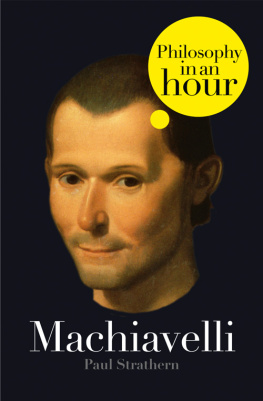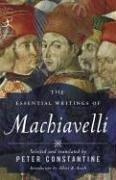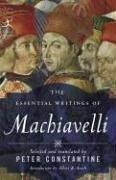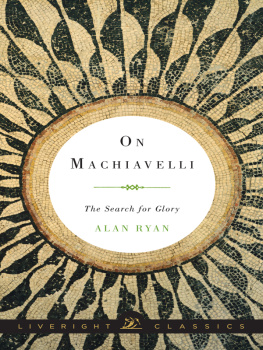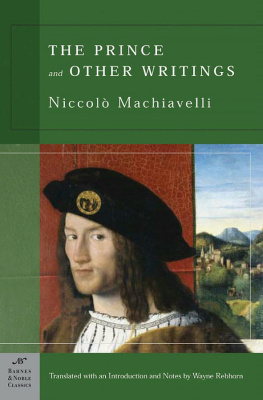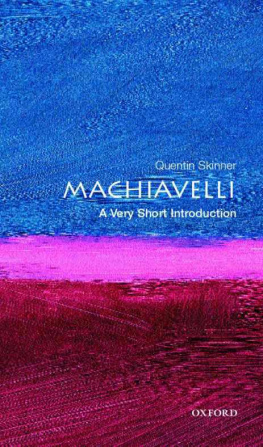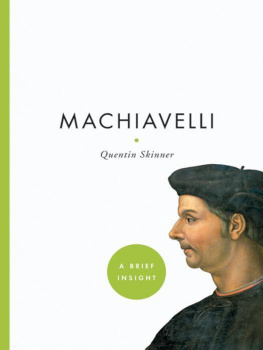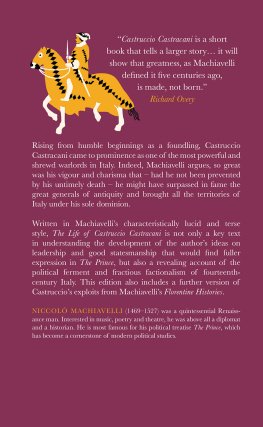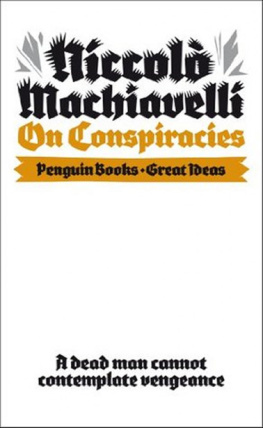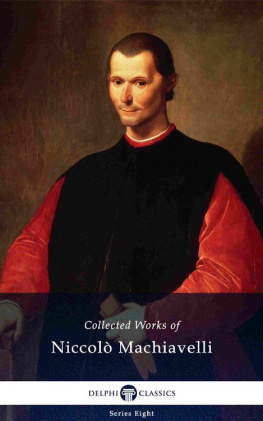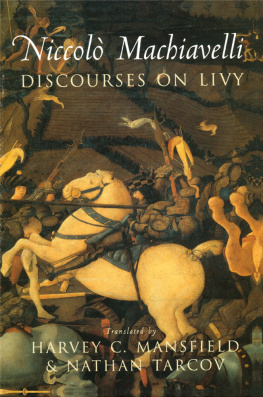Machiavelli Niccolò - Machiavelli: philosophy in an hour
Here you can read online Machiavelli Niccolò - Machiavelli: philosophy in an hour full text of the book (entire story) in english for free. Download pdf and epub, get meaning, cover and reviews about this ebook. City: Hammersmith;London, year: 1998;2012, publisher: HarperCollins Publishers;Harper Press, genre: Detective and thriller. Description of the work, (preface) as well as reviews are available. Best literature library LitArk.com created for fans of good reading and offers a wide selection of genres:
Romance novel
Science fiction
Adventure
Detective
Science
History
Home and family
Prose
Art
Politics
Computer
Non-fiction
Religion
Business
Children
Humor
Choose a favorite category and find really read worthwhile books. Enjoy immersion in the world of imagination, feel the emotions of the characters or learn something new for yourself, make an fascinating discovery.
- Book:Machiavelli: philosophy in an hour
- Author:
- Publisher:HarperCollins Publishers;Harper Press
- Genre:
- Year:1998;2012
- City:Hammersmith;London
- Rating:5 / 5
- Favourites:Add to favourites
- Your mark:
- 100
- 1
- 2
- 3
- 4
- 5
Machiavelli: philosophy in an hour: summary, description and annotation
We offer to read an annotation, description, summary or preface (depends on what the author of the book "Machiavelli: philosophy in an hour" wrote himself). If you haven't found the necessary information about the book — write in the comments, we will try to find it.
Machiavelli Niccolò: author's other books
Who wrote Machiavelli: philosophy in an hour? Find out the surname, the name of the author of the book and a list of all author's works by series.
Machiavelli: philosophy in an hour — read online for free the complete book (whole text) full work
Below is the text of the book, divided by pages. System saving the place of the last page read, allows you to conveniently read the book "Machiavelli: philosophy in an hour" online for free, without having to search again every time where you left off. Put a bookmark, and you can go to the page where you finished reading at any time.
Font size:
Interval:
Bookmark:
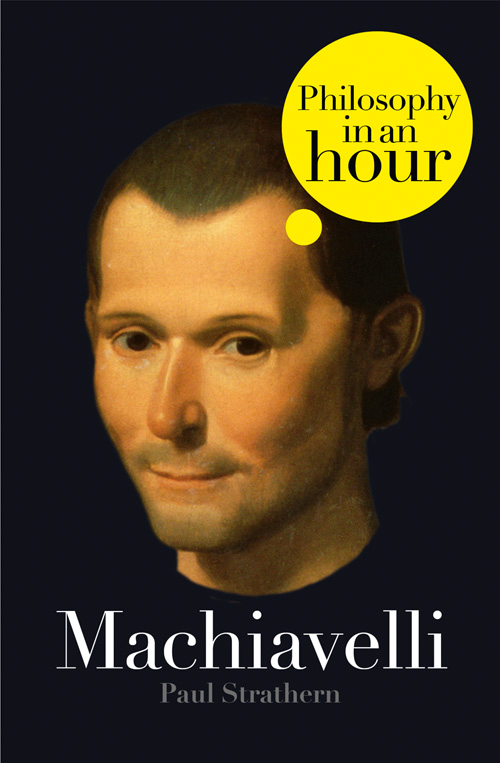
Machiavelli
PHILOSOPHY IN AN HOUR
Paul Strathern

Machiavellis name sends a shiver down the spine. More than 350 years after his death it remains almost synonymous with evil. Yet Machiavelli was not an evil man. And as we shall see, his political philosophy was not evil in itself. It was just extremely realistic.
Our reaction says something about us rather than about Machiavelli. The philosophy of statecraft that he put forward aimed at being scientific. This meant there was no room for sentiment or compassion or even, ultimately, morality.
Machiavellis masterpiece, the single short work for which he will always be remembered, is The Prince. This is a book of advice to a prince on how to run his state. It is highly rational, psychologically perceptive, and addresses the heart of the matter with no nonsense. If you are a prince running a state, your chief aim is to remain in power and run your state to your best advantage. Machiavelli sets down how to do this, using a wealth of historical examples, and with a complete lack of sentimentality. No pussyfooting about: heres the formula.
Machiavellis political philosophy intimately reflects his life, times, and circumstances. Most of his life was spent deeply involved in the politics of Renaissance Italy. As his life progresses, we see the lineaments of his philosophy beginning to emerge, feature by feature, until suddenly he falls from grace and is stripped of all that he considers to be his life. Bereft, and in complete despair, he sits down and writes his masterpiece, The Prince. In just a few months of supreme inspiration, he delivers himself of his entire political philosophy, complete and intact. Its harshness reflects the harshness of the political life he has seen, as well as the harshness of the blow he has just experienced. But this is more than just a political philosophy of its time. Machiavellis thought pinpoints a central aspect of the political philosophy of all time from Alexander the Great to Saddam Hussein. And as we shall see, it also reflects one of the most profound, and profoundly disturbing, truths of the human condition.
Niccol Machiavelli was born in Florence on May 3, 1469. He came from an old Tuscan family, which had in the past achieved some eminence though his was not one of the great powerful families of Florence, such as the Pazzi bankers or the Medici. And by the time Niccol arrived on the scene, his branch of the family had fallen on hard times.
Machiavellis father Bernardo was a lawyer who had fallen foul of the tax man and been declared an insolvent debtor. As such he was forbidden by law from practicing his profession. But no lawyer can be expected to take the law literally. Bernardo managed to practice on the quiet, offering cut-rate service for those who found themselves in an impecunious position similar to this own. His only other source of income was the small estate he had inherited, seven miles south of Florence on the road to Siena. This was an idyllic spot amidst the Tuscan hills, but the grapes and goat cheese hardly provided enough cash to support a family. Life was austere at casa Machiavelli. As Niccol later remarked: I learned to do without before I learned to enjoy. Bernardo could afford no formal education for his son. Occasionally a scholar on hard times would be hired as a tutor. But Bernardo had not always been a broken-down lawyer. He had his own library, and young Niccol was soon reading extensively, especially in classical texts. The pale, deprived boy found his imagination fired by the wonders of ancient Rome.
The isolated child gave way to a solitary adolescent with an apprehensive, sidelong look, which made him appear curiously guilty. He became aware of the world around him: coolly measuring himself against it, measuring it against what he knew from his reading. Even in his isolation he couldnt help realising his superior intelligence. Likewise, he quickly perceived the new humanist outlook that was beginning to permeate so many aspects of the city around him. Florence was emerging from the intellectual torpor of medieval life: the city felt awake, alive, self-confident. Italy was leading Western civilization into the Renaissance. It was possible to dream that Italy might again be united and great, as it had been in the days of the Roman Empire. The perceptive young Niccol began seeing (and imagining) resemblances between the city around him and Rome at the height of its power: the Rome of the second century A.D., in the era leading up to Marcus Aurelius, stoic philosopher, general, emperor. This was the period when the empire stretched from the Persian Gulf to Hadrians Wall, when the Senate still had sufficient power to make itself heard, when the citizens of Rome had been happiest and most prosperous. Heady stuff for a quicksilver young mind whose broken father could provide no role model. Instead, history would provide a more abstract dream.
Machiavellis understanding of the heyday of the Roman Empire was not clouded by the rhetoric of an erudite teacher. Yet he certainly attended some of the public lectures given by the great humanist scholars who were then making Florence the intellectual centre of Europe. Characteristic of these was the poet and humanist Politian, protg and close friend of Lorenzo the Magnificent. Politian was one of the finest poets of the post-Dante era, his verse combining rhetorical flourishes of classical brilliance with the directness and vivacity of everyday Florentine Italian. The scholars at the University of Florence quickly learned how to mimic this elegant poesy. Unhampered by intellectual fashion, Machiavelli began turning this same Florentine Italian into a more clear and direct prose, combining formal manner with popular usage. The Italian language was in its infancy. It had evolved from Florentine dialect less than two centuries earlier, displacing Latin as the literary language. Yet it had already produced its greatest poet (Dante), and in Machiavelli it was now about to produce its finest prose writer.
After the public lectures the young scholars would linger in the Piazza della Signoria, swapping opinions, the latest news on the affairs of the day, gossip. The cool young man with the snide look was soon noticed. His ironic barbs, his witticisms (especially at the expense of the clergy), his piercing intellectual insights, all made their mark. Just as he intended they should. Niccol knew what he was doing: he was establishing himself. (And almost without realising it, he was also creating himself.) He may have had only modest social standing, but he knew he was better than any of them. His mockery provided a suitable mask for such contemptuous conceit. And in his own way Machiavelli soon established himself as the life and soul of the party. The way to succeed was to win popularity. Only the more perceptive among his friends noticed the cool heart that lay behind the mask. Either through pity, respect, or curiosity, this often endeared him to them all the more. A cool heart was a rare phenomenon among the volatile young bloods of Renaissance Florence.
But how was it that Florence, of all places, had become the centre of the Renaissance? Here was a city with little political or military clout, yet it had achieved an influence out of all proportion to its provincial standing.
The obvious answer is money. The Florentine merchant bankers, such as the Medici, Pazzi, and Strozzi families, controlled the new technology of their age. Merchant banking was the revolutionary communication technology of its time. Its development during the fourteenth century had gradually transformed trade and communication throughout Europe. Wealth could be transmitted, in the form of credit or bank drafts, from one end of the continent to another, freeing trade from the customary restraints of barter or cash payment. Silks and spices arriving overland from the Far East at Beirut could be purchased by means of financial transfer and shipped to Venice.
Font size:
Interval:
Bookmark:
Similar books «Machiavelli: philosophy in an hour»
Look at similar books to Machiavelli: philosophy in an hour. We have selected literature similar in name and meaning in the hope of providing readers with more options to find new, interesting, not yet read works.
Discussion, reviews of the book Machiavelli: philosophy in an hour and just readers' own opinions. Leave your comments, write what you think about the work, its meaning or the main characters. Specify what exactly you liked and what you didn't like, and why you think so.

